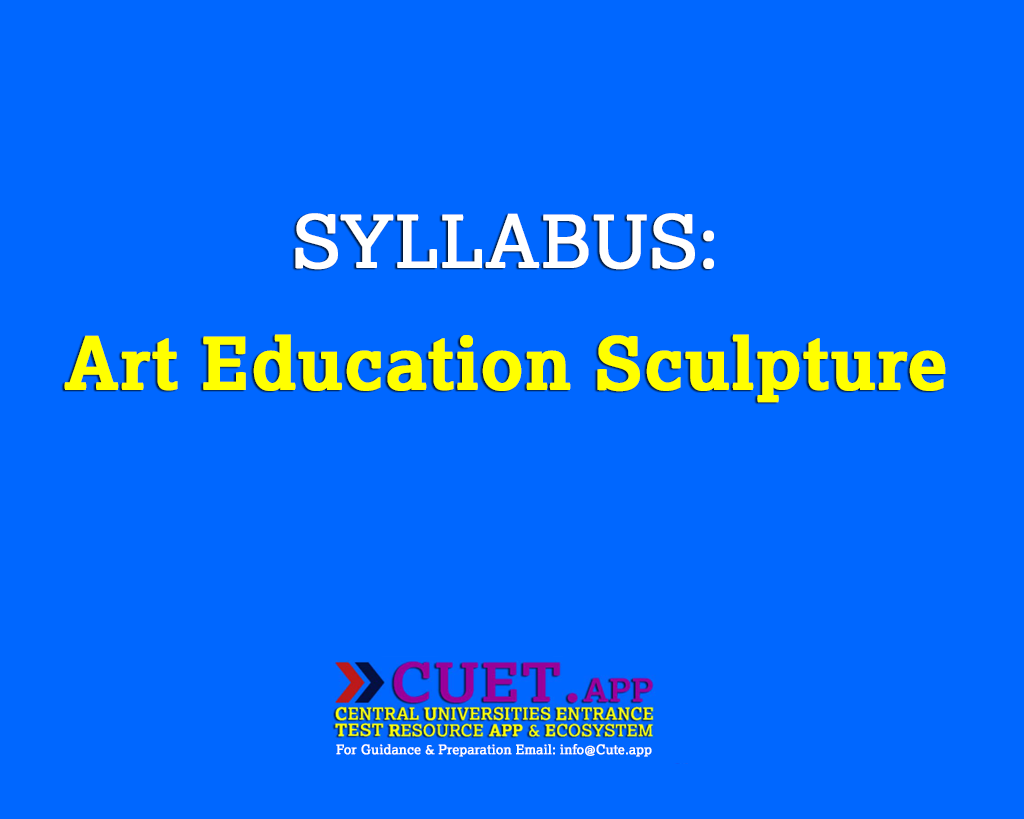FINE ARTS (312) (Painting, Sculpture, Graphics and Commercial Arts) | Syllabus of Class 12
Note: There will be one Question Paper which will have 50 questions out of which 40 questions need to be attempted.
FINE ARTS (312) PAINTING
Unit 1: The Rajasthani and Pahari Schools of Miniature Painting
Unit 2: The Mughal and Deccan schools of miniature painting
Unit 3: The Bengal School and Cultural Nationalism
Unit 4: The Modern trends In Indian Art
Unit 1: The Rajasthani and Pahari Schools of Miniature Painting (16th Century A.D to 19th Century A.D.)
Introduction to Indian Miniature Schools: Western-Indian, Pala, Rajasthani, Mughal, Central India, Deccan, and Pahari.
(A) The Rajasthani Schools
1. Origin and development of the following schools in brief: Mewar, Bundi, Bikaner, Kishangarh, and Jaipur, plus the main features of the Rajasthani schools.
- Study of the following Rajasthani paintings:
Title / Set / Painter School- A Folio from Ramayana paintings of Sahibdin Mewar
- One Court scene or Hunting scene or Festival scene Mewar Jagat Singh II
- One Folio from Ragamala or Rasikapriya Bundi
- One painting of a Hunting Scene in a Forest Kotah with Kotah Maharaja
- Radha (Bani-Thani) byNihal Chand Kishangarh
- Pabuji Ki Phad, Folk Scroll painting Bhilwara
- Maru-Ragini Mewar
- Raja Aniruddha Singh Hara Bundi
- Chaugan Players Jodhpur
- Krishna on swing Bikaner
- Radha (Bani- Thani) Kishangarh
- Bharat Meets Rama at Chitrakuta Jaipur
(B) The Pahari Schools:
Origin and development of Basohli, Guler, and Kangra schools in brief and main features of the Pahari schools
Study of the following Pahari Paintings:
Title / Set / Painter School
- One Folio of Ramayana (Sangri – Early Phase) Basohli
- One Folio of Gita Govinda of Jaideva by Manaku Guler
- One Krishna Lila or Bhagavata Purana Sukh Kangra Folio by Nain
- One painting from Nayaka Nayika Guler or Kangra or Baramasa or Ragamala
- Krishna with Gopis Basohli
- Nand, Yashoda and Krishna with Kinsmen Going to Vrindavana Kangra
Unit 2: The Mughal and Deccani Schools of miniature painting (16th Century A.D. to 19th Century A.D.)
- The Mughal School
Origin and development of the Mughal school in brief and main features of the Mughal School
Study of the following Mughal Paintings:
Title | Painter | School
A Folio from Akbar | Namah Basawan | Akbar
Baber Crossing the river Sone | Jagannath | Akbar
Krishna Lifting Mount Govardhana | Miskin | Akbar
Birth of Salim | Ramdas | Akbar
Jahangir holding the picture | Abul Hassan | Jahangir
Falcon on Bird-Rest | Ustad Mansoor | Jahangir
Kabir and Raidas | Ustad Faquirullah Khan | Shajahan
Marriage procession of Haji | Madni | Provincial
Dara Shikoh | Mughal (Oudh)
FINE ARTS -312
- The Deccani School
Origin and development of the Deccani school and Main features of the Deccan School.
Study of the following Deccani Paintings:
a. Ibrahim Adil Shah II of Bijapur Bijapur
b. Raga Hindola Ahmednagar
c. Ragini Pathamsika Ahmednagar
d. Hazart Nizamuddin Auliya and Amir Khusro Hyderabad
e. Chand Bibi Playing Polo (Chaugan) Golconda - Unit 3: The Bengal School and Cultural Nationalism
New Era in Indian Art – An introduction
Study of the following paintings:
(i) Rama Vanquishing the pride of the ocean Raja Ravi Verma
(ii) Journey’s End AbanidranathTagore
(iii) Parthasarthi Nandlal Bose
(iv) Ghalib’s Poetry Painting based on M.A.R. Chughtai
(v) Select a cubistic painting Gaganendranath Tagore
(vi) Mother and child Jamini Roy
(vii) Female Face Rabindranath Tagore
(viii) Hill Women Amrita Sher Gill
(ix) Shiv and Sati Nandlal Bose
(x) Rasa-Lila Kshitindranath Majumdar
(xi) Radhika M.A.R. Chughtai
(xii) Meghdoot Ram Gopal Vijaivargiya
National flag and the Symbolic significance of its forms and the colours.
Contribution of Indian artists in the struggle for National Freedom Movement
Tiller of the Soil – Nandlal Bose. - Unit 4: The Modern trends In Indian Art Introduction
S.No Painting Artist/Painter
i. Mother Teresa M.F. Hussain
ii. Birth of Poetry K.K. Hebbar
iii. Gossip N.S. Bendre
iv. Tantric Painting G.R. Santosh
v. Words and images K.C.S. Pannikar
vi. Rama Vanquishing the Pride of the Ocean Raja Ravi Varma
vii. Mother and child Jamini Roy
viii. Haldi Grinders Amrita Sher Gil
ix. Mother Teresa M.F. Husain
x. The Vulture Kamlesh Dutt Pande - Sculpture
Study of the following sculptures:
(i) Triumph of Labour D. P. Roychowdhury
(ii) Santhal Family Ramkinker Vaij
(iii) Standing Woman Dhanraj Bhagat
(iv) Cries Unheard Amar Nath Sehgal
(v) Ganesha Figure P.V. Jankiram
(vi) Dhanpal Sankho Chaudhuri
(vii) Chatturmukhi Aekka Yada Giri Rao - Graphic-Prints
(i) Whirlpool Krishna Reddy
(ii) Children Somnath Hore
(iii) Devi Jyoti Bhatt
(iv) Of walls Anupam Sud
(v) Man, Woman and Tree K. Laxma Goud


